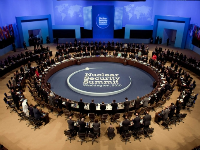Now that the Nuclear Security Summit will become a recurring event, with the next one scheduled for 2012 in Seoul, national governments will need to integrate this new mechanism with the existing major multinational efforts designed to counter nuclear terrorism.
Despite differences in membership, emphasis, and other dimensions, three prominent initiatives directly support the summit's objective of enhancing international cooperation to prevent nuclear terrorism: the Global Partnership against the Spread of Weapons and Mass Destruction, United Nations Security Council Resolution 1540, and the Global Initiative to Combat Nuclear Terrorism. Last week's summit documents endorsed their activities, without specifying how the newly institutionalized Nuclear Security Summit process will relate to them.
Like the Nuclear Security Summit, the other initiatives responded to the new threat represented by the availability of nuclear materials and technologies to non-state actors, such as terrorist groups and transnational criminal organizations sometimes supported by state sponsors. The international nuclear nonproliferation regime, centered on the Nuclear Non-Proliferation Treaty (NPT), was designed to counter illegal proliferation by nation-states. The Nuclear Security Summit and related initiatives aim to supplement that protection by constructing a layered, in-depth defense against the evolving nuclear terrorism threat presented by non-state actors.

